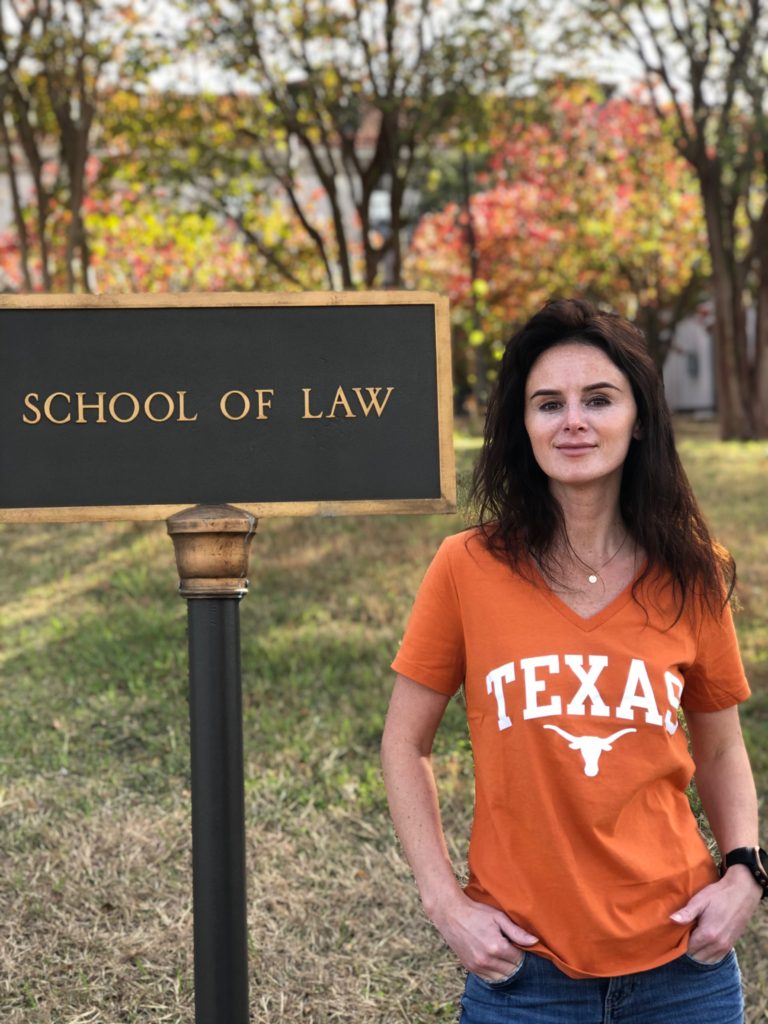As part of its monthly Research Fellow Spotlight, the Institute for Transnational Law sat down with Viktoriia (Vikky) Ishchenko on November 19, 2019 to learn about her research interests in global energy. In addition to serving as a 2019-2020 Research Fellow in the Institute for Transnational Law at The University of Texas School of Law, Ms. Ishchenko is also a Fulbright studentfrom Ukraine pursuing a LL.M. (Master of Laws) in Global Energy, International Arbitration, and Environmental Law at The University of Texas School of Law. Below is a transcription of the interview.
Please tell us about your research interests.
My research interests are focused on assessment of the United States’ regulatory triggers for wind power development, including offshore and hybrid electric systems generation.
As a Ukrainian lawyer, I have been involved in the oil and gas industry over the past seven years. Before I started my research fellowship in the Institute for Transnational Law, I believed that nothing could compete with natural gas and petroleum as the world’s main power sources. This, however, slightly changed when I started learning more about the increasingly important role of renewable energy sources in the US.
The U.S. Energy Information Administration reports that in 2018 renewable energy sources accounted for about 17% of US electricity generation. Nearly 90% of the increase in US renewable electricity between 2008 and 2018 came from wind and solar generation. In particular, wind generation rose from 55 million MWh in 2008 to 275 million MWh in 2018 (6.5% of total electricity generation).
Wind power is considered one of the fastest growing sectors in the US due to many factors. The key growth triggers are capacity additions and federal/state policies. Taken together, these factors result in rapid development of onshore and offshore wind power farms as well as “hybrid” electric systems that combine wind and solar electric technologies. Thus, my research paper focuses on regulatory issues driving wind power generation in the US.
What has your journey been to this point?
I pursued my Bachelor of Laws and Master of Laws at the Odesa National Law Academy, in Odesa, Ukraine. More than 7 years ago, I started my career in the energy sector in different roles: as legal counsel at the biggest oil production company in Ukraine, as a member of the Energy, Oil, and Gas Committee of the Ukrainian Bar Association, as a member of Coordinating Council of Young Lawyers of the Ministry of Justice of Ukraine, and as a practicing attorney. However, the more you learn and do, the more you realize how many interesting issues in your area are yet to be uncovered! I was constantly seeking ways to improve my knowledge and experience in the field of Energy Law. This search brought me to The University of Texas at Austin whose LL.M. Program in Global Energy, International Arbitration, and Environmental Law is ranked by LLM Guide among the top 10 LL.M. Programs for Energy Law in the world. Now I am proud to be a Fulbright Scholar, a Texas Law student, and a MD Anderson Research Fellow.
Can you speak of any challenges that you have had to overcome?
Energy Law is not only about regulations. It is truly interdisciplinary and requires knowledge of the structure of the energy industry, transactions, dispute resolution, and environmental law, science, and policy. In addition, since the United States is a common law country, Energy Law has grown out of case law. All these issues can take you on a long and interesting journey. You might lose your sense of time by reading impressive logical conclusions made in the past by such prominent Supreme Court Justices as Antonin Scalia. Therefore, the biggest challenge for me is to stay focused when there is so much to learn and do as a law student at UT.
What advice would you give to your younger self?
I would say to my younger self that uncertainty does not mean you are on a wrong path. In fact, feeling uncertainty means you are leaving your zone of comfort, accepting new challenges, and create something bigger in your life. From where I sit now, I can say that uncertainty is a precondition of growth.
What lessons did you learn from your own research, which have shaped your way of thinking?
I discovered that research is not only about reading, thinking, and writing. It is important to keep your eyes open and to explore all the aspects of research. This, in turn, can be achieved by attending conferences and events related to your topic and by talking with professors, classmates, and industry experts.
This interview was conducted by Dr. Mauricio Pajón, Director of Programs and Development, Institute for Transnational Law.


